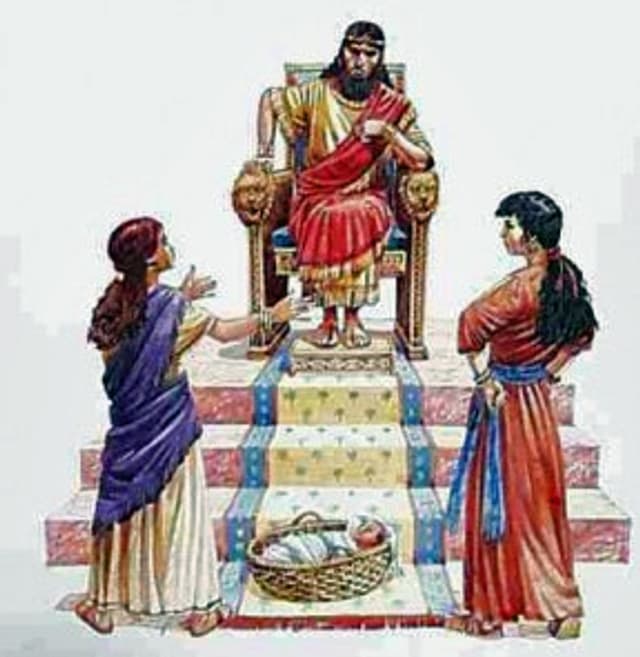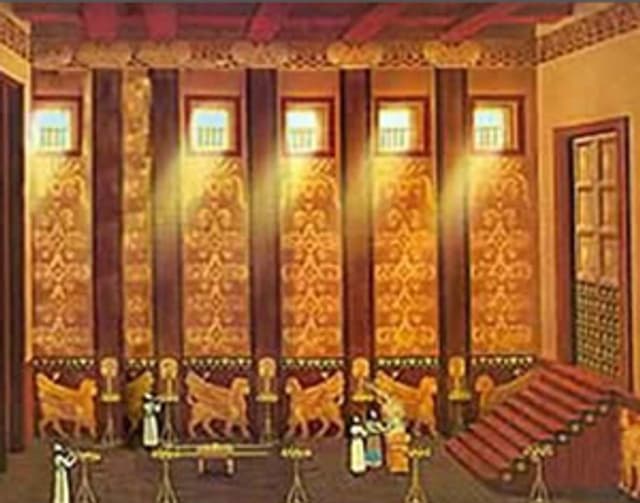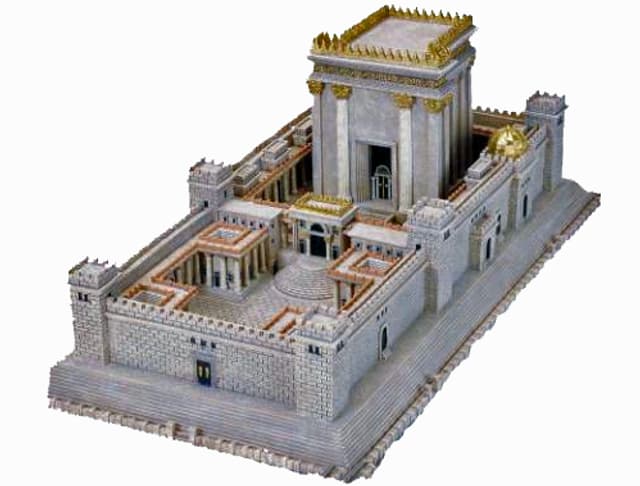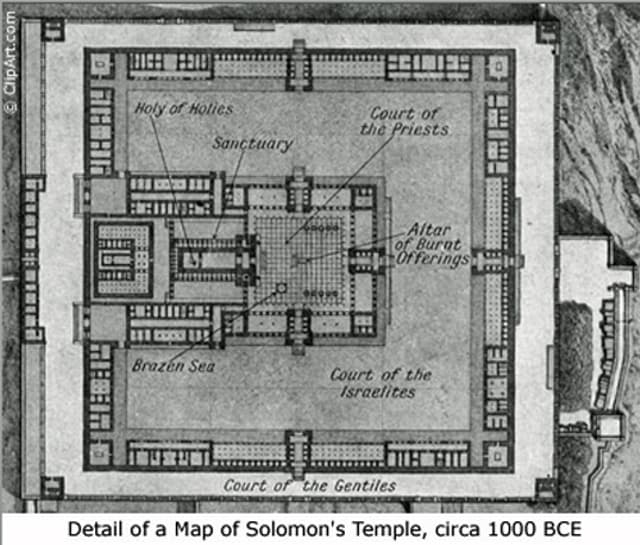The first ever major donor dinner – c. 970 BC
- Exhibited by
- Ian Clark, Church of England.
- Added
- July 28, 2010
- Medium of Communication
- Event.
- Target Audience
- Individuals, single gift.
- Type of Charity
- Religion related.
- Country of Origin
- Israel/Palestine.
- Date of first appearance
- circa 970 BC.
SOFII’s view
Was this, really, the first ever major donor dinner? And what can we learn from it, now? SOFII believes our history is important. It has to be valued and preserved so that future generations of fundraisers can learn from it. It has to be researched and categorised so that it can accessed easily and made widely available. It took just one night to raise the money to build Solomon's Temple. The Torah's book of Chronicles records how King David hosted the first recorded major donor dinner, an evening in his palace with the gathered heads of families and tribes. In his after-dinner speech he cast the compelling vision for a gold-clad temple with all the trimmings. King David ended his pitch that night with the announcement of his own lead gift and a challenge appeal. The money raised in that night of fundraising has been estimated to be the equivalent of $400 million. Not bad for the first major donor dinner.
Creator / originator
The story is told in the Jewish Torah that forms an important part of the Christian Bible (the Old Testament) and Islamic Koran. A detailed account, interspersed with other stories, appears in the books of royal chronicles written by the official court historians, from chapter 13 of the first book of Chronicles to chapter 7 of the second book. David's key fundraising appeal appears in 1 Chronicles 29.
Summary / objectives
King David plans a capital fundraising campaign to build a permanent temple for the Jews to worship God in Jerusalem, and starts it with a large personal gift.
Background
The Jewish tribes had settled into the area of modern Palestine and Israel. David had been chosen as the second king over the twelve Jewish tribes. A brilliant general, musician and poet, he had beaten and plundered neighbouring tribes and forged alliances with regional superpowers. He made Jerusalem the capital of the emerging nation. He organised for the 'Ark of the Covenant' – the Jews' most sacred object made by Moses centuries before to hold the Ten Commandments – to be brought in triumph to the city so it became a religious as well as secular capital.
Guided by the prophet Nathan, David set out his vision for a wonderful permanent temple to replace Moses' temporary tabernacle (tent). He drew up detailed plans for the building and contributed significant amounts of gold, silver and other precious materials from his personal (plundered) wealth. By then an old man, he arranged for his son Solomon to become king and lead the actual building project. Then he called the leaders of the Jewish tribes together, and encouraged them to give God (YHWH) a magnificent new home under Solomon's leadership.
He focused potential donors on the wider vision of consecrating themselves to God's (YHWH) service, rather than the temple building itself – that is merely a means to a greater spiritual end. In the prayer that follows, he points out that God (YHWH) actually provides all our wealth and resources on loan to us. Our gifts are merely a small 'thank you' to God. David's key sentence, 'Everything comes from you, and we have given you only what comes from your hand' has been used during the collections in religious services ever since.
Influence / impact
The temple became the focus of the Jews' worship of God YHWH for four centuries before Jerusalem was ransacked by the Babylonians. It was later re-built by the Jewish King Herod, but destroyed by the Romans. It stood near the current site of the Dome on the Rock in Jerusalem, a sacred area for three major world religions – Judaism, Christianity and Islam – even today 3000 years later.
Results
Solomon's Temple, completed around 960 BCE, was a magnificent golden structure that became the key sacred place for Jews and a major tourism attraction in the ancient world. Many of the key events in Jesus' life happened in the temple and surrounding complex.
Merits
The second oldest detailed record of a fundraising appeal. The oldest is the story of Moses fundraising for the Tabernacle, the predecessor of the temple.
Key learning points from this fundraising include:
- David brings the Ark to Jerusalem (2 Samuel 6, 1 Chronicles 13 and 15).
- David checks with his trusted adviser Nathan about the need for a permanent home for the Ark (1 Chron 17).
- David delegates the implementation phase to a trusted younger man, Solomon (1 Chron 22).
- David enlists the help of regional superpowers to get resources (eg Lebanon for cedar wood, 1 Chron 22).
- David draws up detailed plans of the building and the resources and staffing needed – a viable business plan (1 Chron 28).
- David gives the leaders a vision of what God (YHWH) wants (1 Chron 29).
- David makes a significant gift from his own personal wealth – setting a leadership example (1 Chron 29).
- David appeals to his local tribal leaders to set an example themselves and then spread the message (1 Chron 29).
Other relevant information
The main Bible text is 1 Chronicles 29, 1-20 (see below, and link).
The web has lots of photos of reconstructions of what the temple must have looked like. For example, here, here and here.
1 Chronicles 29:1-20
(New International Version - UK)
Gifts for building the Temple
Then King David said to the whole assembly: "My son Solomon, the one whom God has chosen, is young and inexperienced. The task is great, because this palatial structure is not for man but for the LORD God. With all my resources I have provided for the temple of my God — gold for the gold work, silver for the silver, bronze for the bronze, iron for the iron and wood for the wood, as well as onyx for the settings, turquoise, stones of various colours, and all kinds of fine stone and marble — all of these in large quantities. Besides, in my devotion to the temple of my God I now give my personal treasures of gold and silver for the temple of my God, over and above everything I have provided for this holy temple: three thousand talents of gold (gold of Ophir) and seven thousand talents of refined silver, for the overlaying of the walls of the buildings, for the gold work and the silver work, and for all the work to be done by the craftsmen."
"Now, who is willing to consecrate himself today to the LORD?"
Then the leaders of families, the officers of the tribes of Israel, the commanders of thousands and commanders of hundreds, and the officials in charge of the king's work gave willingly. They gave towards the work on the temple of God five thousand talents and ten thousand darics of gold, ten thousand talents of silver, eighteen thousand talents of bronze and a hundred thousand talents of iron. Any who had precious stones gave them to the treasury of the temple of the LORD in the custody of Jehiel the Gershonite.
The people rejoiced at the willing response of their leaders, for they had given freely and wholeheartedly to the LORD. David the king also rejoiced greatly.
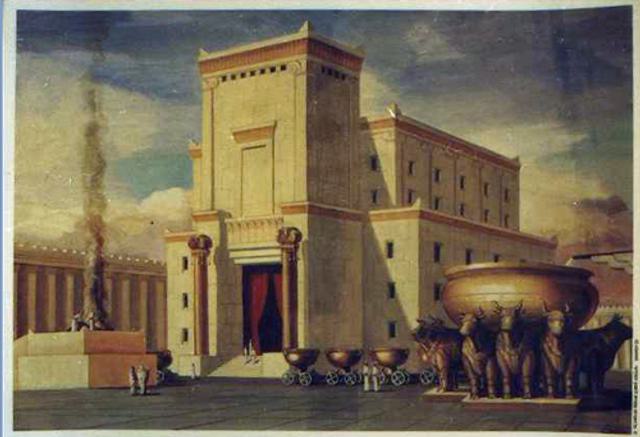 View original image
View original image
